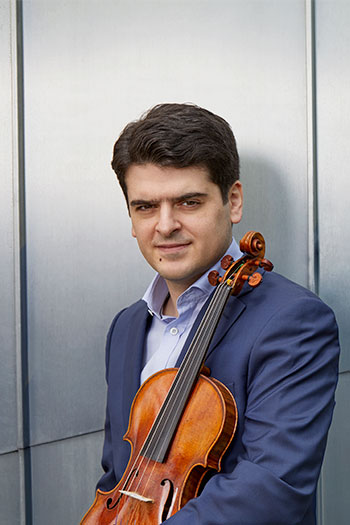West-Eastern Divan Ensemble brings admirable qualities to Kravis Center

As the Arab-Israeli conflict continued to boil Sunday with an exchange of fire on the Gaza Strip, a chamber ensemble made a modest effort to build bridges between the two sides.
The West-Eastern Divan Ensemble, composed of young Arab and Israeli musicians, performed a concert of classics at the Kravis Center in West Palm Beach. The ensemble, making its first U.S. tour, comes from the larger West-Eastern Divan Orchestra, founded in 1999 by Israeli conductor Daniel Barenboim and his Palestinian friend, the late literary scholar Edward Said.
High-minded enterprises like these can produce more good intentions than good music making. Fortunately the young string players on stage played in a polished, professional manner. If not at the level of the world-class chamber groups that routinely come through South Florida, their playing was committed, forceful and full of feeling for the works presented.
Despite the musician’s Middle Eastern origins, the program was strictly European, drawn from the works of Brahms, Schubert, Tartini and Mendelssohn. The ensemble will perform an almost identical program Monday night at the Arsht Center in Miami before heading north to continue the tour.
In his string sextets, Brahms audibly relaxes and gives rein to the lyrical gift he sometimes kept in check in his orchestral works. In the opening Allegro of his String Sextet No. 1, the musicians played with rich sonorities, shimmering textures and passionate intensity in the melodies that suddenly spun up from individual instruments.
The opening melody of the Andante, which may be Brahms’ most famous chamber movement, didn’t quite achieve the rugged grandeur of the best performances. And there were intonation issues that came and went through the evening. But the musicians brought a sense of growing force to the movement and played in an effectively glassy manner as the texture lightened.
They performed the Scherzo in a muscular, vigorous manner, with a transparency that let all the parts come through while maintaining a firm sense of the melodic line. The last movement was full of dignity and drama, with a rich, symphonic texture.
Violinist Michael Barenboim, son of the co-founding conductor, served as first violin and performed two solos. His high degree of technical skill was apparent in Schubert’s Rondo in A Major. Barenboim’s tone felt heavy for the work, possibly because he was trying to project in the Kravis Center’s large hall, which isn’t ideal for chamber music. His playing was clean and sparkling in the fast passages, and the ensemble played with Schubertian lilt and grace.
Barenboim’s performance of Tartini’s Devil’s Trill Sonata was unusual in that he played it as a solo without piano accompaniment. With its rolling chords and lightning-fast passages, the Tartini can stand on its own like the unaccompanied violin sonatas of Bach. But without the harmonic complexity and rhythmic bite of the piano, the work lost a lot.
Barenboim played in a dramatic and fiery manner, powering through the famous trill passages that give the work its name. But overall the performance felt monotonous, vague and uncompelling.
The best playing of the evening came in the Octet that Mendelssohn composed at the age of 16—one of the miracles of classical music.
The opening Allegro was polished, airy and shot through with the ebullience that is a special mark of Mendelssohn’s music. The Andante was turbulent and brooding, with the musicians fully entering into the drama, with bleak solo lines and emphatic attacks.
The Scherzo, with that feathery tone that was also Mendelssohn’s special property, was a model of sustained, disciplined tension, as the musicians played the rustling music at pianissimo volume. The concluding Presto opened with effectively jarring, aggressive tones in the cellos and then burbled along busily, with the musicians effectively bringing out the shards of melody that rose above all the rapid notes of the ensemble.
The West-Eastern Divan Ensemble performs 7:30 p.m. Monday at the Arsht Center in Miami. arshtcenter.org
Posted in Performances
Leave a Comment
Mon Feb 24, 2020
at 12:59 pm
No Comments






